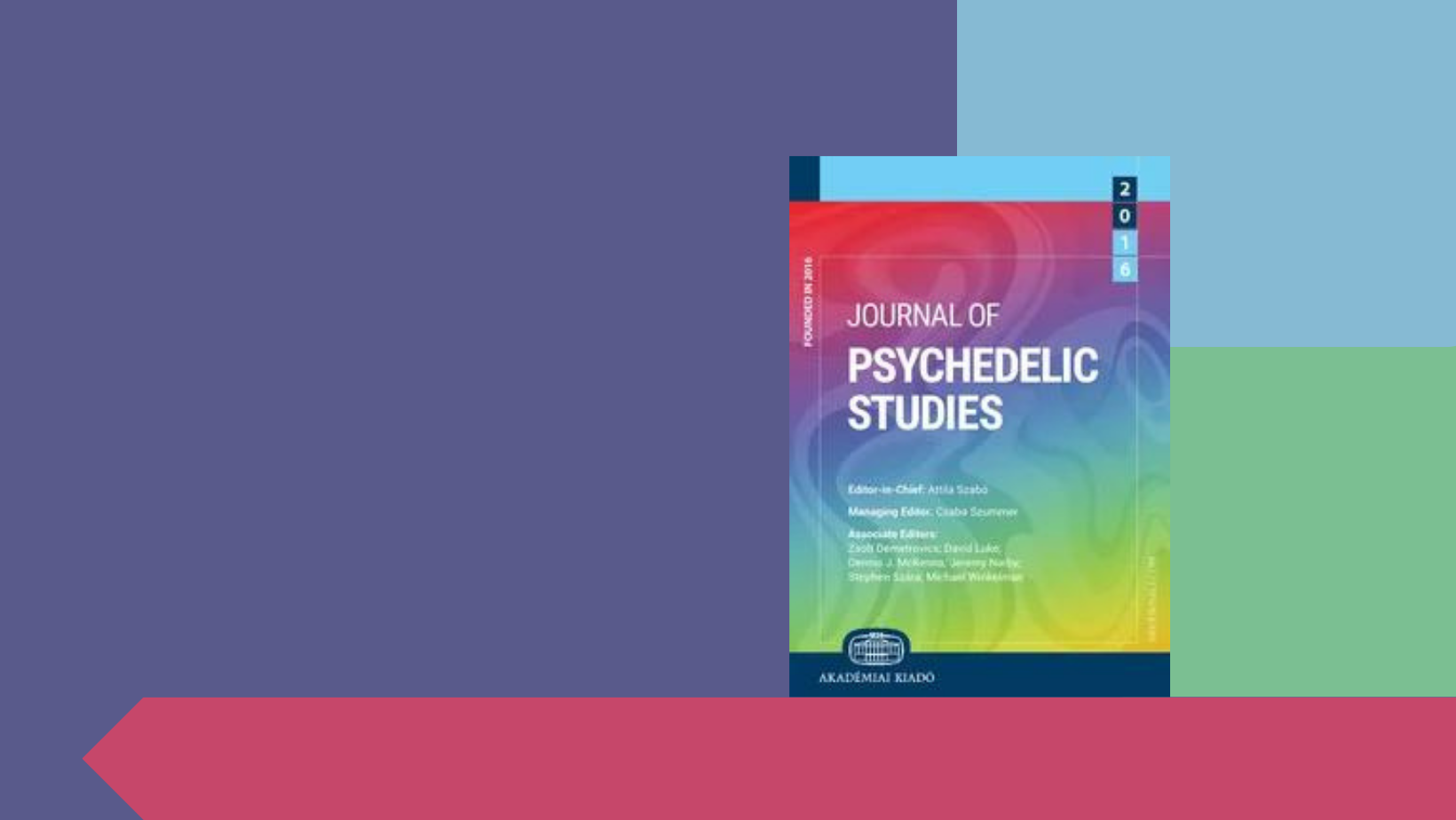In February 2023, the Drug Enforcement Administration (DEA) released a document to the legal team representing the Church of the Eagle and the Condor (CEC). This disclosure came two years after the CEC and the Chacruna Institute for Psychedelic Plant Medicines submitted two FOIA requests to the DEA and the Department of Justice requesting all records pertaining to ayahuasca.
The report, titled “Ayahuasca: Risks to Public Health and Safety,” was issued in July 2020. It takes a very clear stance against the use of ayahuasca, claiming that it presents a significant risk to public health and safety. The report is in line with the prohibitionist approach of the US government, which has continued to target ayahuasca groups through seizures, arrests and other actions. The report is also a strong indication that the government will be resistant to recognizing religious minorities and traditional populations’ rights.
On June 9, 2023, the Chacruna Institute published an article in the peer-reviewed Journal of Psychedelic Studies contesting the DEA’s report. The article, “The DEA Report on Ayahuasca Risks: ‘Science’ in Service of Prohibition?” was written in partnership with leading experts on ayahuasca, including scholars from the fields of biology, neuroscience, psychology, psychiatry, anthropology, and sociology.
This article shows that the prohibitionist paradigm and the persecution of ethnic and religious minorities will not be ignored and that the global scientific community is taking a stand against the criminalization of ayahuasca.
The article challenges a number of assertions made by the DEA, highlighting significant factual omissions, theoretical biases, and misinterpretations of existing data. The article highlights how the DEA report severely downplays the safety profile and therapeutic potential of ayahuasca, ignores a vast body of epidemiological evidence from its use among Indigenous and religious communities around the world, and overemphasizes the risks, while failing to include current research on ayahuasca demonstrating its potential benefits.
This shows that the prohibitionist paradigm and the persecution of ethnic and religious minorities will not be ignored and that the global scientific community is taking a stand against the criminalization of ayahuasca. If you want to read the full critique of the DEA’s report, click the button. To support this kind of critical psychedelic scholarship, please consider donating to support Chacruna’s mission.
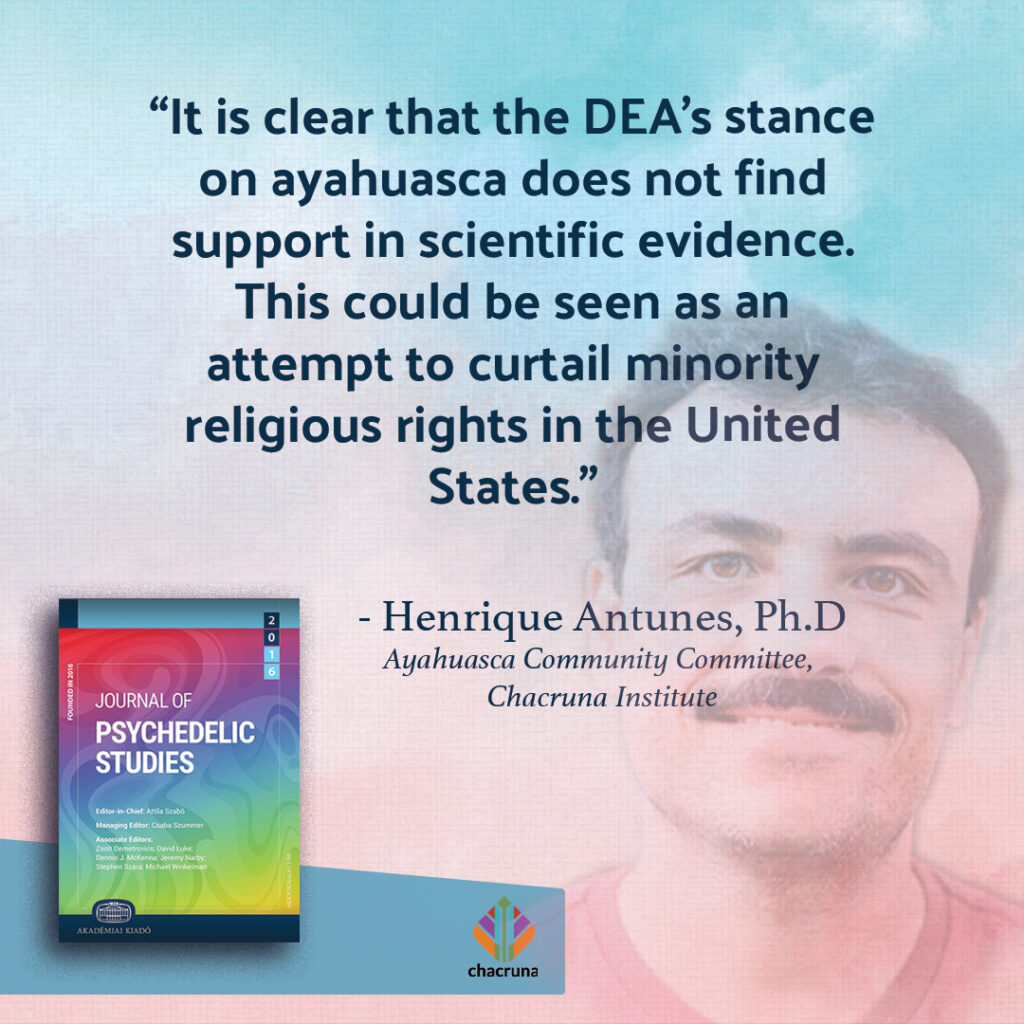
The impact of the DEA is highly negative, given that the classification of ayahuasca as a controlled substance hinders the possibilities of research regarding its therapeutic potential. In addition, the controversial classification of DMT in the Schedule I list of controlled substances, which includes drugs with no currently accepted medical use and a high potential for abuse, is also a matter of concern, since the DEA insists in arguing that ayahuasca is an analog or an equivalent to DMT. Finally, by stating that the use of ayahuasca is a potential risk to public health, the DEA takes the opposite direction of the current research and the available knowledge. Any change in this scenario would imply a paradigmatic shift in the agency’s standpoint not only regarding ayahuasca but psychedelic substances in general, which is not likely in the foreseeable future. – Henrique Antunes, PhD, Ayahuasca Community Coordinator, Chacruna Institute
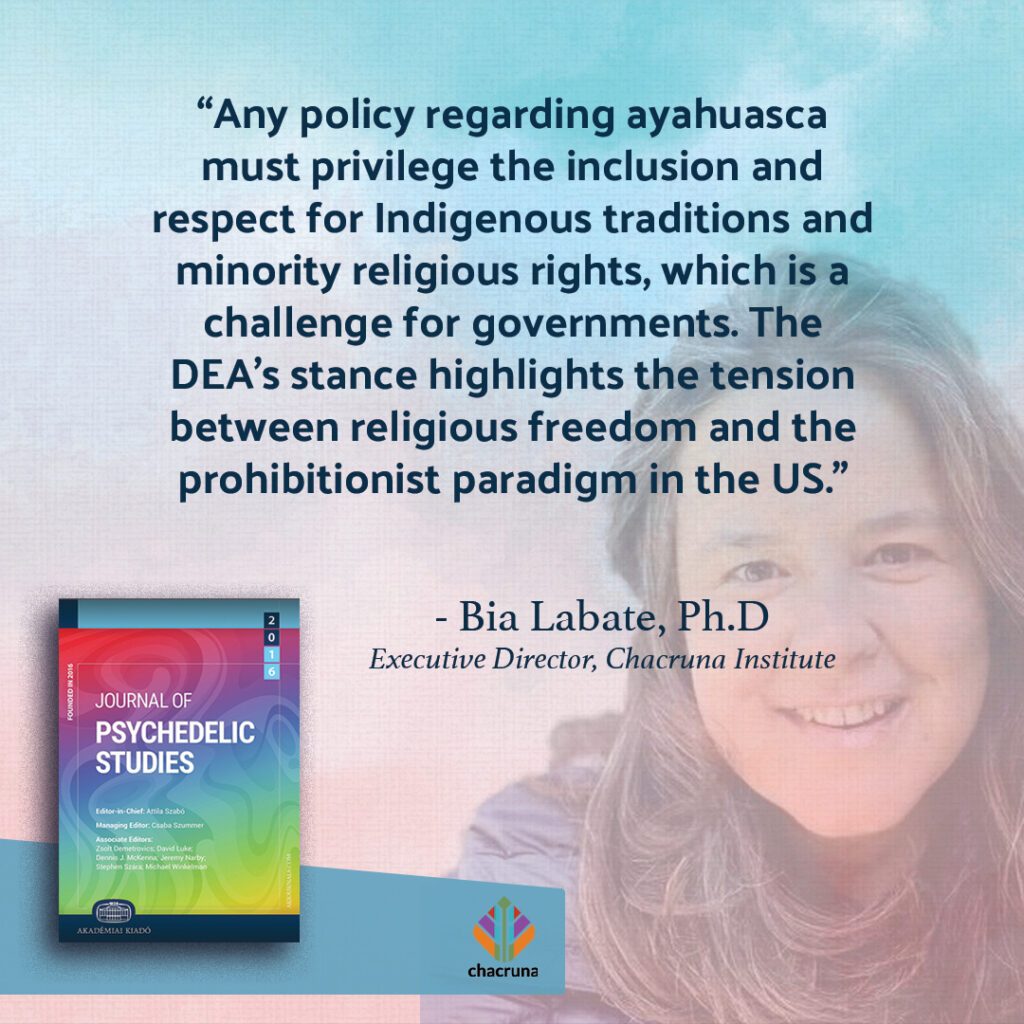
Health professionals need to recognize the historical and cultural values of these plant medicines for Indigenous and traditional populations. These groups have been using ayahuasca and other plant medicines for centuries as part of their traditional healing systems. It is important to understand that we are dealing with traditions that do not abide by the concepts of Western healing, and that have their own logic and value. These practices must be recognized on their own terms. It is not a matter of opposing traditional healing systems and Western medicine, but of recognizing the uniqueness and importance of the former. In fact, it is widely known that in order to develop research and policy on ayahuasca it is crucial to consider the gathered knowledge and the experience of the groups that have been taking ayahuasca for centuries – Bia Labate, PhD, Executive Director, Chacruna Institute
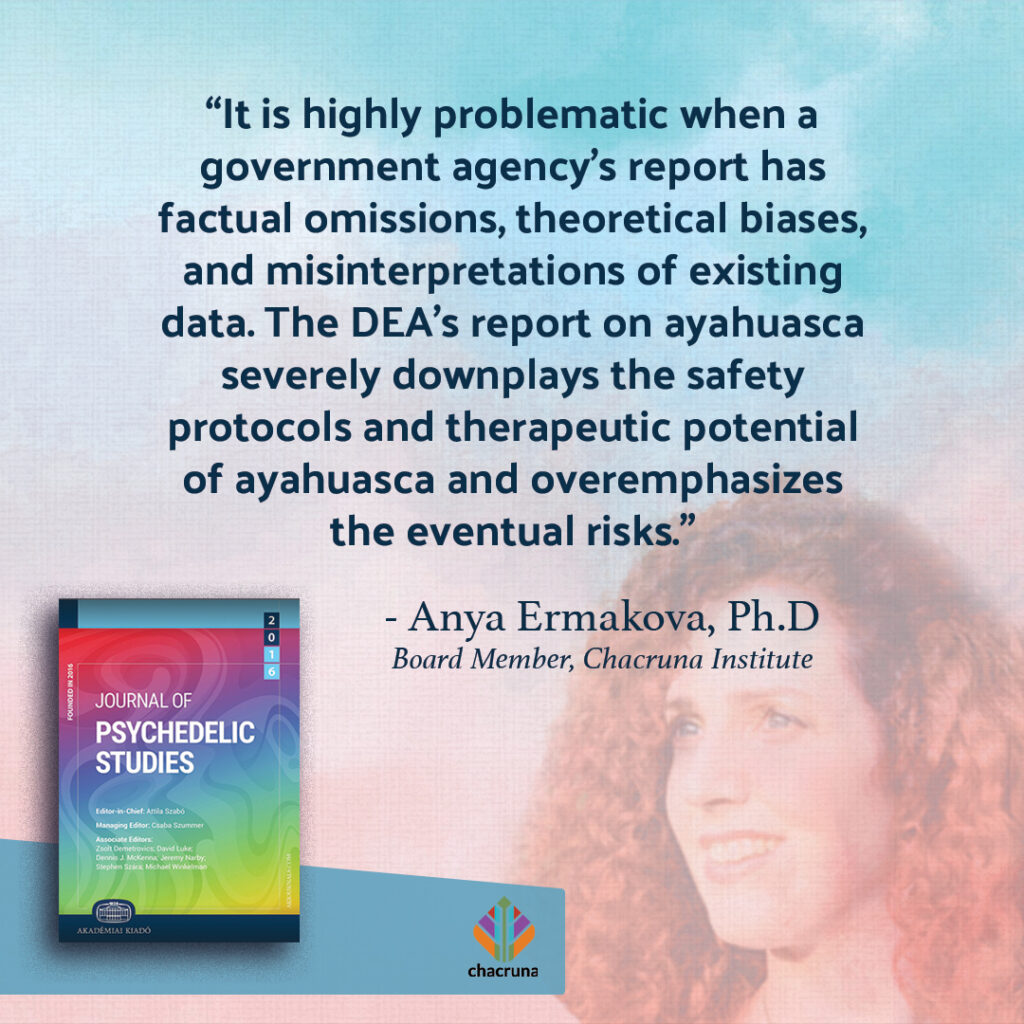
Once FDA approves a drug for medical use, DEA will have to reschedule. DEA does accept petitions to reschedule, but has never granted one. Congress could also legislate the descheduling, but hasn’t done so with cannabis even after 25 years of legalization at the state level – Sean McAllister, JD, Board Member, Chacruna Institute

The DEA report severely downplays the safety profile and therapeutic potential of ayahuasca and overemphasizes the risks. The report completely omitted any reference to the first ayahuasca randomized controlled trial that suggested good tolerability and potential efficacy for depression (Palhano-Fontes et al., 2019). The DEA report evidence review was clearly not systematic and seemed to only use references that reinforced a negative bias. – Kelan Thomas, PharmD, MS, Chacruna Chronicles editorial team
Criminalizing drug use gives the DEA its raison d’être. Ideally, we should have congress intervene and pass legislation protecting ayahuasca, which has proven to be able to heal spirituality and psychologically and is an integral part of many legitimate traditions. – Martha Hartney, JD, Chacruna’s Council for the Protection of Sacred Plants
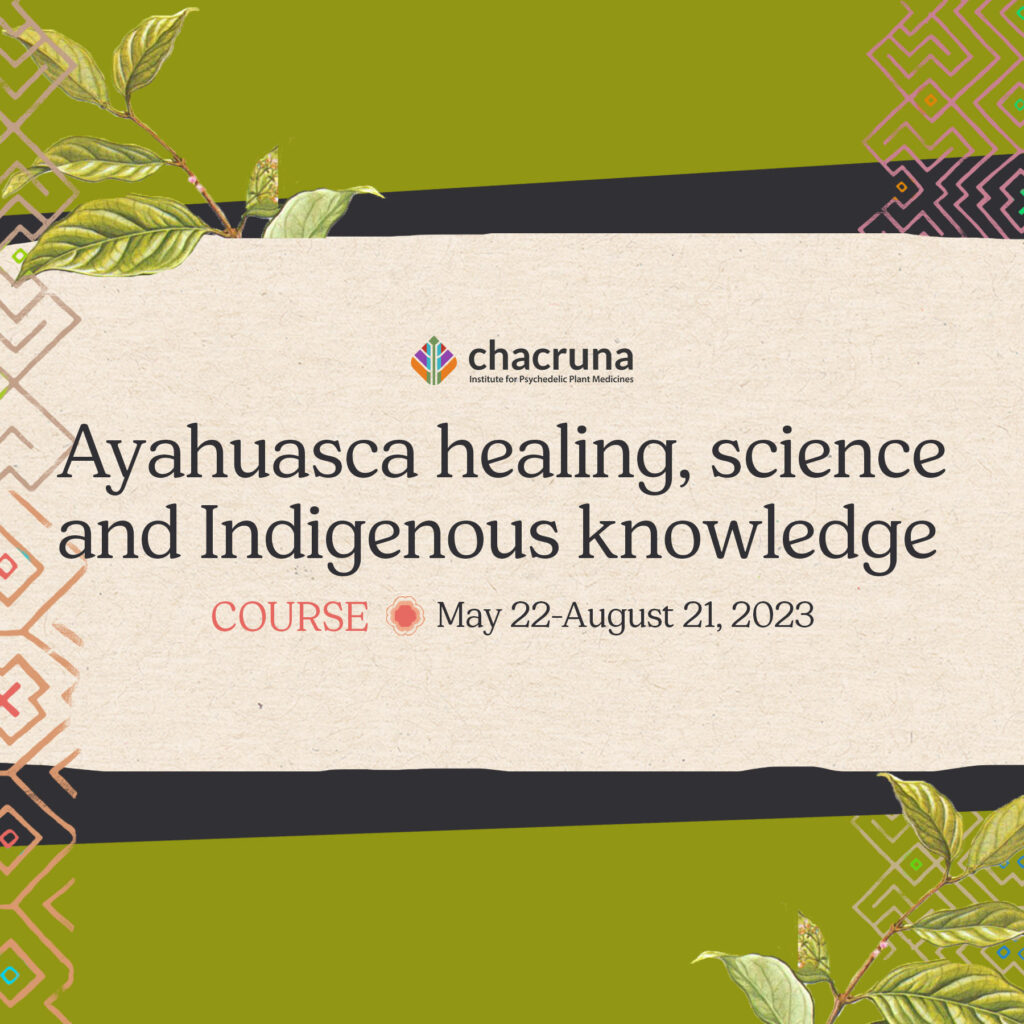
This 12-week course, Ayahuasca Healing, Science and Indigenous Knowledge (May 22nd – August 21st, 2023), will teach students the science of psychedelic healing. Psychedelic-assisted therapy clinical trials have shown promise for treating a variety of behavioral health indications, and the topics covered in this course will describe some of the potential mechanisms of action for these psychedelic benefits. Faculty will include Dr. Simon Ruffell, Dr. Henrique Antunes, Dr. Adam Aronovich, and more!

This 8-week course, The Science of Psychedelic Healing (June 6th – August 1st, 2023), will teach students the science of psychedelic healing. Psychedelic-assisted therapy clinical trials have shown promise for treating a variety of behavioral health indications, and the topics covered in this course will describe some of the potential mechanisms of action for these psychedelic benefits. Faculty will include Dr. Jordan Sloshower, Dr. Anna (Anya) Ermakova, Dr. Kelan Thomas, and more!
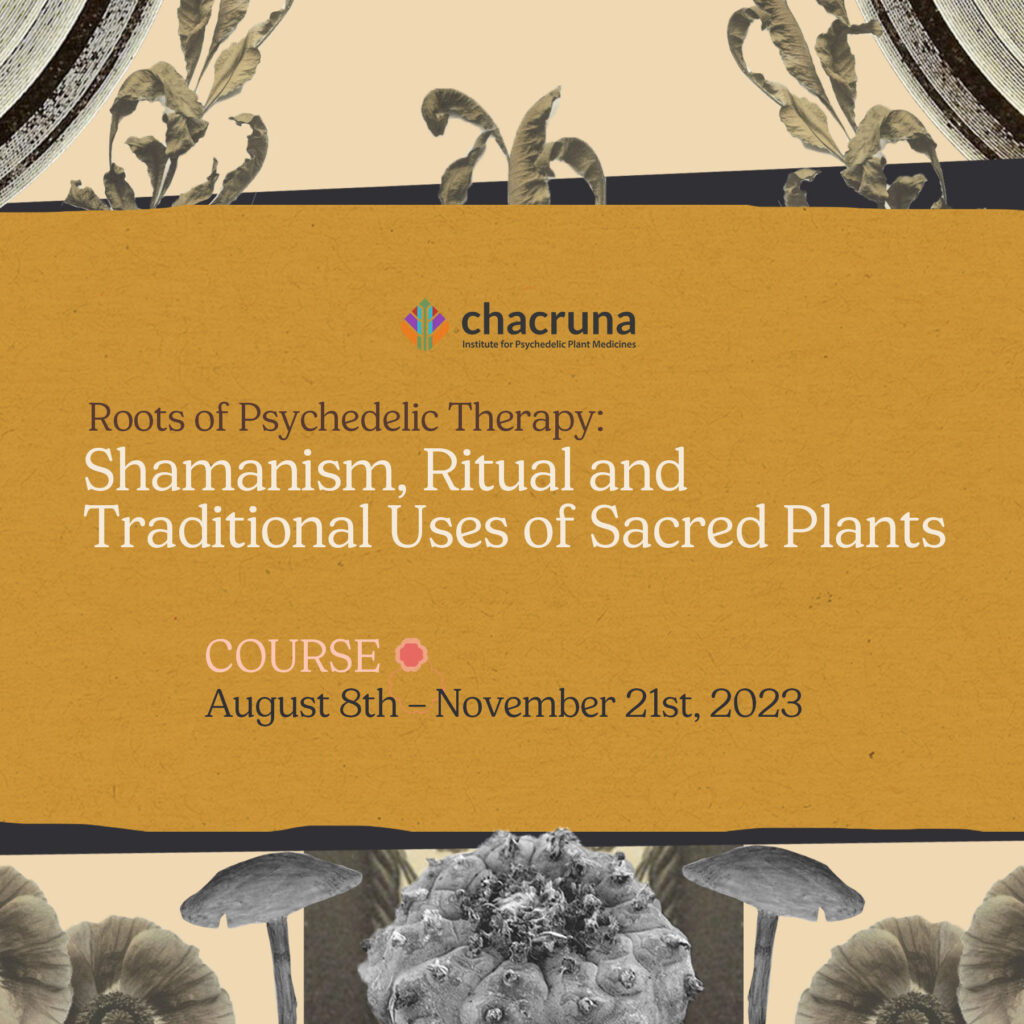
This 16-week course, Roots of Psychedelic Therapy: Shamanism, Ritual and Traditional Uses of Sacred Plants (August 8th – November 21st, 2023), will be composed of a series of independent lectures taught by the Chacruna Institute’s team and affiliates. It will lay out the foundation of the use of sacred plants through historical, cultural, indigenous, ‘traditional’ and contemporary lenses. Faculty will include Dr. Nidia Olvera, Sean McAllister, J.D., Dr. Kevin Feeney, and more!
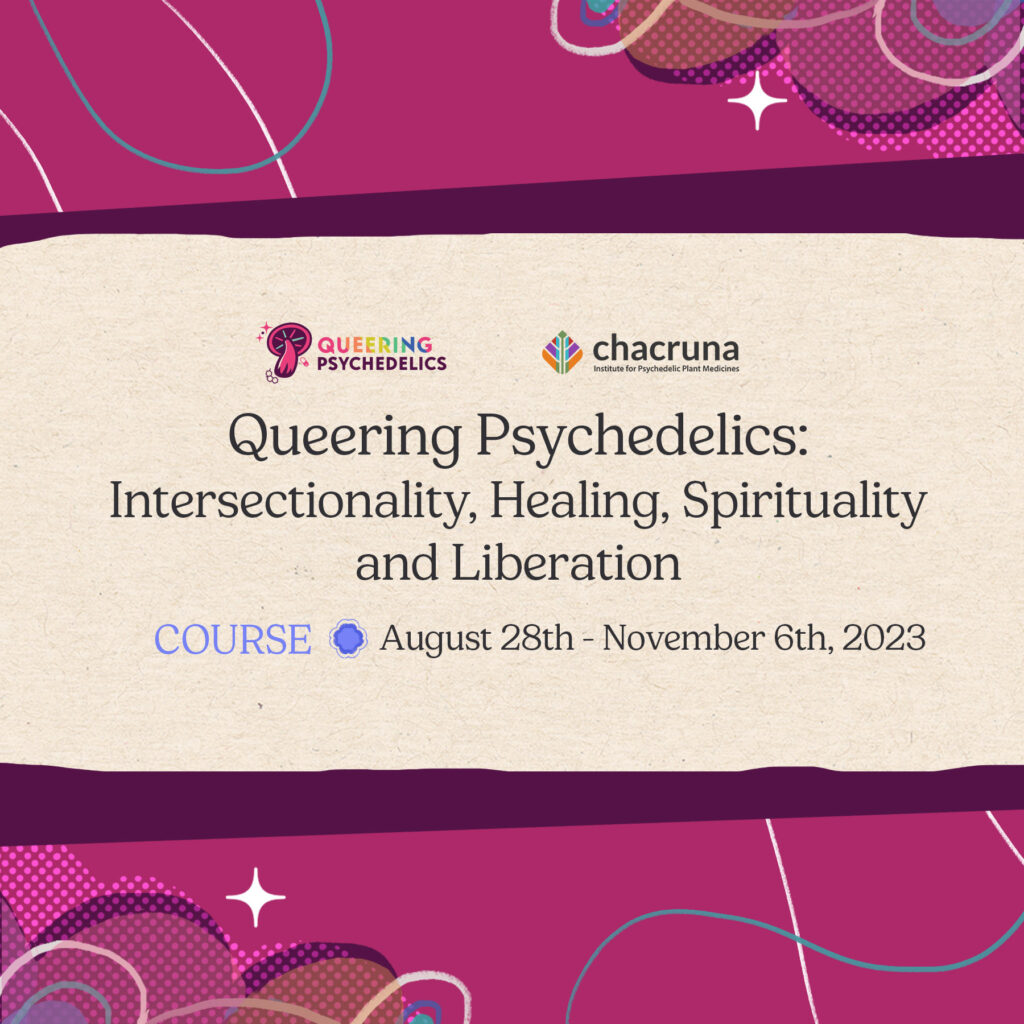
Queering Psychedelics: Intersectionality, Healing, Spirituality and Liberation – Live/Online will be a 9-week course held August 28th – November 6th, 2023. Keep an eye out for more details! Faculty will include Dr. Bia Labate, Dr. Alex Belser, Taylor Dahlia Bolinger, LMSW, and more!
About Chacruna Institute
The Chacruna Institute for Psychedelic Plant Medicines, is a 501(c)(3) non-profit organization co-founded by Brazilian anthropologist Dr. Bia Labate and American psychologist Dr. Clancy Cavnar, based in Northern California and with strong ties to Brazil and Mexico. We promote reciprocity in the psychedelic community, and support the protection of sacred plants and cultural traditions. We advance psychedelic justice through curating critical conversations and uplifting the voices of women, queer people, Indigenous peoples, people of color, and the Global South in the field of psychedelic science.
Contact Information
Lorien Chavez
Chacruna Institute
[email protected]
415-390-6157
Take a minute to browse our stock:
Did you enjoy reading this article?
Please support Chacruna's work by donating to us. We are an independent organization and we offer free education and advocacy for psychedelic plant medicines. We are a team of dedicated volunteers!
Can you help Chacruna advance cultural understanding around these substances?










